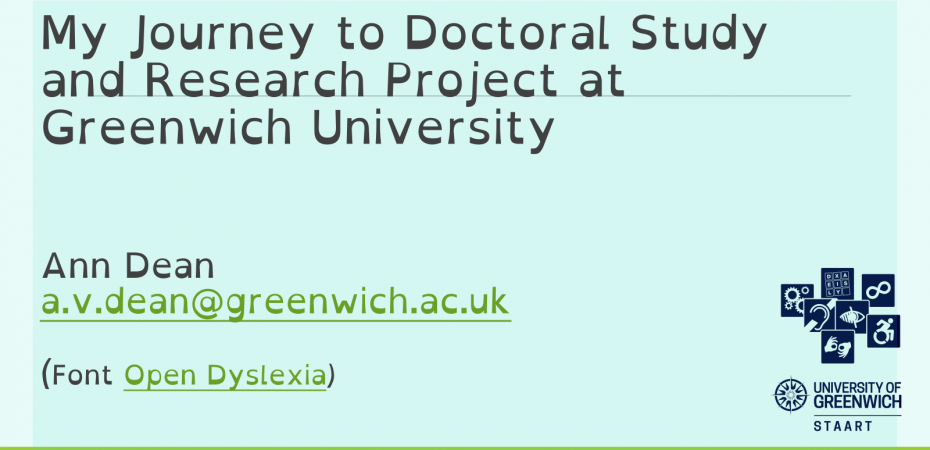Presenting My Story and Education Doctorate Research Project at the Inaugural STAART/ILD Symposium for Neurodiversity Week .
further information is on the official webiste for neurodiversity week here.
I was very pleased to be invited to present my story and research as a neurodiverse mature student at the above event at Greenwich University. My presentation was on “Autistic Graduates Sharing Their Diagnosis for Employment and My Story”

I started my presentation by reflecting on my educational journey before university. Then discussed university progression before moving on to my neurodivergence of dyslexia. After this, I shared why I started this epic educational journey and my current research project. In addition to sharing my blog and the recent publication in a neurodivergent authors’ only journal AchievAbility. I discussed the following in the presentation above. In essence, having had a 25-year career in local government I then decided to undertake academic study, at the University of Greenwich via a partner college. Culminating in a career change to a teacher initially. This epic journey was prompted by my then manager saying I could not apply for a new job at work because I needed a degree! This has brought me to the point of researching for my Education Doctorate after 11 years of studying obtaining a BAHons getting a first-class degree, then teacher training after which I studied MA in Education and on to the Ed D. This was made possible due to widening participation and inclusion which applied to me I thought because I was a mature student!
This journey has not been easy, but choosing an initial subject that related closely to my work made it a little easier. Until I got to the Masters in Education when it was suggested by a lecturer, that I seek assessment for Dyslexia. I had always struggled with English language and literature at school only gaining a CSE grade 1 being equivalent to an O’level English. Tacking stock I did feel this may be a possibility because I was aware of some of the traits as poor reading skills, higher verbal than written skills and poor working memory (explained here by British Dyslexia Association). I now see that I noticed some of the traits in myself at school for example reading words backwards and writing letters back to front and having no interest in reading stories, as I could not follow the plot! Also, English language and literature were my poorest subjects, only gaining a CSE grade 1 equivalent to an O’Level grade C, the stronger ones being sciences and maths. No assessment was made or suggestions at school about this possibility as I coped.
Therefore, I embarked on getting support to find an assessor get a diagnosis and then apply for Disabled Students Alowance (DSA). The university was very supportive and awarded some funding towards the assessment. The assessment was completed and I did indeed assess as dyslexic, working memory being the most prominent component for me. I then applied for Disabled Students’ Allowance which was quite straightforward.
After the assessment and application for DSA I received my support package (Study Skills and assistive technology support and training). I have not looked back since completing my MA Ed Tech with distinction. Except I am now a DSA non-Medical Help supporter for Autistic University Students myself too delivering mentoring study skills and assistive technology training. A role that suits me and gives me a genuine understanding of their needs in addition to giving me the flexibility to work and study.
My study is about autistic graduates progressing into work and sharing (disclosing) their neurodivergence, which is complex and multifaceted. The research question:-
” What are the employment prospects for Autistic Graduates when transitioning into the workplace and considering sharing (disclosing) their neurodivergence?” (Lindsay et al 2021)
I am hoping to complete The Ed D by 2025 although as stated I am struggling at present. I preferred giving this presentation to writing up my thesis. However, as usual, I have a pragmatic approach, so I have gathered my data by mixed methods and carried out an initial analysis. In addition to having a conceptual framework. This hinges on the theory of stigma by Goffman (1959) .
This was a very rewarding experience for me and has helped me move forward with my project and make changes to my current study plan and support. I feel that this was because I was able to network face to face with other students and academics who were all neurodivergent and found some who had a similar study and work experience to me.
Keep on keeping on.

